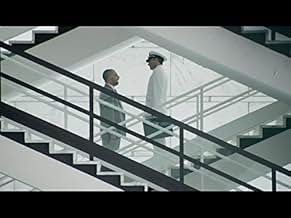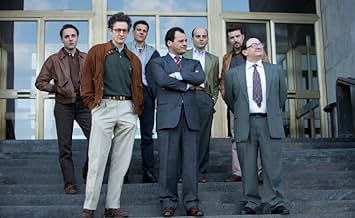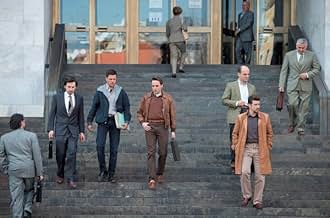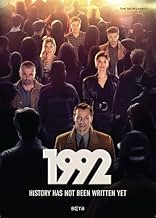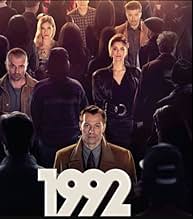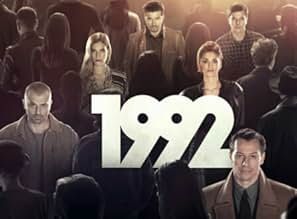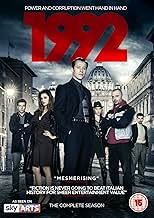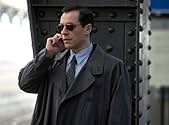1992
- Serie de TV
- 2015
PUNTUACIÓN EN IMDb
7,5/10
2,6 mil
TU PUNTUACIÓN
Seis personas, cuyas vidas se ven envueltas en el frenético ambiente político de la Italia de principios de los 90.Seis personas, cuyas vidas se ven envueltas en el frenético ambiente político de la Italia de principios de los 90.Seis personas, cuyas vidas se ven envueltas en el frenético ambiente político de la Italia de principios de los 90.
- Creación
- Reparto principal
- Premios
- 1 nominación en total
Explorar episodios
Reseñas destacadas
Great stuff.
I'm British and finding this period in Italian history gripping.. the great acting helps too
10colinebc
I didn't expect this quality.
Some made a comparison with House of cards or Mad men.
I couldn't disagree more.
I think this show is far BETTER than those ones.
First, it does not fall into the usual traps of Us series like Damages or House of Cards, who tend to develop far too complicated plots. Of course 1992 tells a complex story with dozens of different characters, but the plot is not over complicated and remains terribly realistic.
I am starting to be reeeeeally fed up with those plots with countless twists and turns, with presumably good persons who turn out to be horrible and vice-versa, and then the opposite, and so on, until a point where you don't understand anything and, worse, you don't see the point in watching the program anymore.
1992 has not this default. The 10-episodes finally appear to be ONE, consistent story, not so complicated in the end.
Second, specific attention has been drawn to ALL the characters. They could definitely exist in real life. Not only the main characters, but also the secondary ones (the politicians like Nobile, the Judge Di Pietro, Notte's daughter, etc.), and this is stunning.
Third, many different universes are depicted. Where most of the traditional TV shows tend to focus on ONE, determined universe, the authors of 1992 have decided to juxtapose at least 3 different worlds : politics, justice, and advertising. This is amazingly well done. Each of these universes is depicted with a different atmosphere and a specific attention. In particular, the politic world is fantastically depicted (the national assembly, the way the parliament members impose discipline on the party sections, the lobbying, the electoral campaign, and so on). I couldn't remember any TV show or movie showing so many details of the "political cookery".
The dialogues reflect the specificity of each of these worlds, which is, also, impressing. Because you do not speak the same way in the parliament or in the office of the general attorney. And they are often very funny, too.
Fourth, the plot has a meaning. I mean, of course, the first priority is to watch a TV show with an exciting plot (and it is), good dialogues (and they definitely are) and characters. But this show gives more. It offers a certain vision of human societies (could have been the same story in ancient Rome, or almost). And when a good story offers a vision, I call it literature. Good literature!
Some made a comparison with House of cards or Mad men.
I couldn't disagree more.
I think this show is far BETTER than those ones.
First, it does not fall into the usual traps of Us series like Damages or House of Cards, who tend to develop far too complicated plots. Of course 1992 tells a complex story with dozens of different characters, but the plot is not over complicated and remains terribly realistic.
I am starting to be reeeeeally fed up with those plots with countless twists and turns, with presumably good persons who turn out to be horrible and vice-versa, and then the opposite, and so on, until a point where you don't understand anything and, worse, you don't see the point in watching the program anymore.
1992 has not this default. The 10-episodes finally appear to be ONE, consistent story, not so complicated in the end.
Second, specific attention has been drawn to ALL the characters. They could definitely exist in real life. Not only the main characters, but also the secondary ones (the politicians like Nobile, the Judge Di Pietro, Notte's daughter, etc.), and this is stunning.
Third, many different universes are depicted. Where most of the traditional TV shows tend to focus on ONE, determined universe, the authors of 1992 have decided to juxtapose at least 3 different worlds : politics, justice, and advertising. This is amazingly well done. Each of these universes is depicted with a different atmosphere and a specific attention. In particular, the politic world is fantastically depicted (the national assembly, the way the parliament members impose discipline on the party sections, the lobbying, the electoral campaign, and so on). I couldn't remember any TV show or movie showing so many details of the "political cookery".
The dialogues reflect the specificity of each of these worlds, which is, also, impressing. Because you do not speak the same way in the parliament or in the office of the general attorney. And they are often very funny, too.
Fourth, the plot has a meaning. I mean, of course, the first priority is to watch a TV show with an exciting plot (and it is), good dialogues (and they definitely are) and characters. But this show gives more. It offers a certain vision of human societies (could have been the same story in ancient Rome, or almost). And when a good story offers a vision, I call it literature. Good literature!
Here we have a wonderfully written and produced historical fiction based on events occurring in Italy (mainly) during the '90ies (this is meant to be the first season covering the year 1992). It's a pity I didn't watch it 2 years ago when it was originally released: 2 years is a lot of things watched meanwhile and I might have enjoyed it even more.
In 1992 I was 13 like the protagonist's daughter. Possibly I remember much more of that year, its vibe, people's bafflement and reactions, than most non-historians adults. Then, various cultural dynamics heavily fighting unlawful conducts matured and gained power; peculiar loathing was raised by the standard corruptive practices in politics. This resulted in a period of political instability (or irrelevance?) that hasn't actually ended yet (but that's debatable). Perhaps the major effect was the influence on the new generations' perspective: more disillusioned, and - if not more honest - at least less dumb. And still victims of yet other fairy tales: the show business, liberalism and various forms of populism.
While in today's connected world these events might seem unimportant, they represented an overwhelming wake-up call for the people of one of the major economies of the planet (like Italy was in the 90ies). And portrayed in this fashion they truly shine. Many lines, scenes and acting moments are brilliant in their gritty cynicism, evocative glamour or punching irony.
Nonetheless we have a volatile screenplay as well: mostly it's incredibly vivid but throughout the series we have also a bit too many in-depth romantic relationships, anguish-squeezing drama and trite situations. Above all: too many tight links among the fictitious/historic protagonists. They meet and influence the core story-line; then they leave each other; then they meet again and change the story again. And this happens multiple times for all the main characters: a bit too much to be believable. Writers could have given some space to other actors without generating the natural skepticism that occurs when "history worthy" things happen but no real history book talks about our fictional protagonists: is it likely?
A couple of things nearly kept me from giving the series a full 9 (i.e. like Tea Falco's delivery, Accorsi's "too cool" character, or a populist congressman and a starlet having public-sex in central Rome: a little too much beyond belief...) but overall it's just nitpicking (and actually Accorsi carries every scene he's in).
International appeal is a possible concern though: the story-line is very complex, with a lot of different real-life people involved about whom you can hardly find anything online which is not in Italian. So any attempt to give substance and depth to what non-Italian audiences are watching might easily fail. And this could ultimately result in a parade of politicians, bureaucrats, businessmen, etc etc you don't know and care about.
Given this caveat, 1992 is surely one of the best recent historic-drama series worldwide; so good it could well be used to entertain and still inspire bored high-schoolers towards serious history research.
In 1992 I was 13 like the protagonist's daughter. Possibly I remember much more of that year, its vibe, people's bafflement and reactions, than most non-historians adults. Then, various cultural dynamics heavily fighting unlawful conducts matured and gained power; peculiar loathing was raised by the standard corruptive practices in politics. This resulted in a period of political instability (or irrelevance?) that hasn't actually ended yet (but that's debatable). Perhaps the major effect was the influence on the new generations' perspective: more disillusioned, and - if not more honest - at least less dumb. And still victims of yet other fairy tales: the show business, liberalism and various forms of populism.
While in today's connected world these events might seem unimportant, they represented an overwhelming wake-up call for the people of one of the major economies of the planet (like Italy was in the 90ies). And portrayed in this fashion they truly shine. Many lines, scenes and acting moments are brilliant in their gritty cynicism, evocative glamour or punching irony.
Nonetheless we have a volatile screenplay as well: mostly it's incredibly vivid but throughout the series we have also a bit too many in-depth romantic relationships, anguish-squeezing drama and trite situations. Above all: too many tight links among the fictitious/historic protagonists. They meet and influence the core story-line; then they leave each other; then they meet again and change the story again. And this happens multiple times for all the main characters: a bit too much to be believable. Writers could have given some space to other actors without generating the natural skepticism that occurs when "history worthy" things happen but no real history book talks about our fictional protagonists: is it likely?
A couple of things nearly kept me from giving the series a full 9 (i.e. like Tea Falco's delivery, Accorsi's "too cool" character, or a populist congressman and a starlet having public-sex in central Rome: a little too much beyond belief...) but overall it's just nitpicking (and actually Accorsi carries every scene he's in).
International appeal is a possible concern though: the story-line is very complex, with a lot of different real-life people involved about whom you can hardly find anything online which is not in Italian. So any attempt to give substance and depth to what non-Italian audiences are watching might easily fail. And this could ultimately result in a parade of politicians, bureaucrats, businessmen, etc etc you don't know and care about.
Given this caveat, 1992 is surely one of the best recent historic-drama series worldwide; so good it could well be used to entertain and still inspire bored high-schoolers towards serious history research.
Great political series from Italy
Anyone who was interested in politics in the first half of the 1990s could hardly believe what was happening in Italy back then. A Milan investigative team called "Mani pulite" (Clean Hands) ensured that the Italian political system collapsed with its investigations. Christian Democrats and Socialists, who had previously taken control of the state, had to go down quietly due to their involvement with the mafia - and what followed: Silvio Berlusconi! How this rancid television station boss and obscure real estate shark managed to reach the highest state positions remained an unsolvable mystery for all non-Italians. Until the main actor Stefano Accorsi came up with the brilliant idea of coming up with this great series, which, alongside "Borgen" from Denmark, is one of the best that Europe has to offer.
What is it about? Six people from Italian society are thrown into disarray by the shocks caused by manipulation. Leonardo Notte is a greasy advertising executive who doesn't let anything go wrong. It must have been a real joy for CoppaVolpi award winner Stefano Accorsi to be able to write a highly erotic bed scene into the script with every beautiful woman in the series. But he was expressly granted that, because his role and the entire series in general were fantastically successful. By a stupid coincidence, Pietro Bosco (Guido Caprino), ex-Iraq War soldier and ex-rugby player, is elected to parliament as a representative of the newly formed Lega Nord. The beautiful Veronica Castello (Miriam Leone) is an occasional prostitute and dreams of a great career. Since the Roman film industry only collapsed a few years ago, something like this is only possible in Berlusconi's television empire, which offered employment opportunities to many scantily clad women in those years. Luca Pastore (Domenico Diele) works at Manipulite and is determined to find out which entrepreneur is responsible for the contaminated blood that infected him with the AIDS virus. The attractive Beatrice Mainaghi (Tea Falco) is a snotty heiress to a super-rich Milanese entrepreneur, but soon realizes that the southern Italian mafia is already extremely well connected in Milan. And then there is the opaque Rocco Venturi (Alessandro Roja), a likeable colleague of Luca, but who has his own agenda...
Director Guiseppe Gagliardi (also "The Dead of Turin" is said to have been quite successful) lets these six people attack each other and, at the same time, paints a picture of an Italy in the midst of huge upheaval. This is so beautifully done. You should definitely see this! Everything comes up: the mafia attacks on Sicily, radioactive weapons during the Iraq War, the borderline moronic television program of Berlusconi's stations, the downfall of the Italian party system and the brilliant idea of making a sleazy and corrupt solo entrepreneur the new beacon of hope . Donald Trump and his supporters have certainly been inspired. BRRRRRRRRR!
Two other actors should be specifically mentioned here: Elena Radonicich plays an investigative journalist and is also Veronica's big sister, Gianfelice Imparato is a cynical Christian Democrat who takes the stupid political newcomer Pietro under his wing.
Oh yes, in the management of SKY Italia, which produced this exceptional series, Nils Hartmann from Germany was responsible for the production of "1992", its successors "1993" and "1994", "Gomorrah" and "The Young Pope". A track record that is impressive.
This series is definitely worth it! Be sure to check it out! Make no mistake: Bella Italia is everywhere!
Anyone who was interested in politics in the first half of the 1990s could hardly believe what was happening in Italy back then. A Milan investigative team called "Mani pulite" (Clean Hands) ensured that the Italian political system collapsed with its investigations. Christian Democrats and Socialists, who had previously taken control of the state, had to go down quietly due to their involvement with the mafia - and what followed: Silvio Berlusconi! How this rancid television station boss and obscure real estate shark managed to reach the highest state positions remained an unsolvable mystery for all non-Italians. Until the main actor Stefano Accorsi came up with the brilliant idea of coming up with this great series, which, alongside "Borgen" from Denmark, is one of the best that Europe has to offer.
What is it about? Six people from Italian society are thrown into disarray by the shocks caused by manipulation. Leonardo Notte is a greasy advertising executive who doesn't let anything go wrong. It must have been a real joy for CoppaVolpi award winner Stefano Accorsi to be able to write a highly erotic bed scene into the script with every beautiful woman in the series. But he was expressly granted that, because his role and the entire series in general were fantastically successful. By a stupid coincidence, Pietro Bosco (Guido Caprino), ex-Iraq War soldier and ex-rugby player, is elected to parliament as a representative of the newly formed Lega Nord. The beautiful Veronica Castello (Miriam Leone) is an occasional prostitute and dreams of a great career. Since the Roman film industry only collapsed a few years ago, something like this is only possible in Berlusconi's television empire, which offered employment opportunities to many scantily clad women in those years. Luca Pastore (Domenico Diele) works at Manipulite and is determined to find out which entrepreneur is responsible for the contaminated blood that infected him with the AIDS virus. The attractive Beatrice Mainaghi (Tea Falco) is a snotty heiress to a super-rich Milanese entrepreneur, but soon realizes that the southern Italian mafia is already extremely well connected in Milan. And then there is the opaque Rocco Venturi (Alessandro Roja), a likeable colleague of Luca, but who has his own agenda...
Director Guiseppe Gagliardi (also "The Dead of Turin" is said to have been quite successful) lets these six people attack each other and, at the same time, paints a picture of an Italy in the midst of huge upheaval. This is so beautifully done. You should definitely see this! Everything comes up: the mafia attacks on Sicily, radioactive weapons during the Iraq War, the borderline moronic television program of Berlusconi's stations, the downfall of the Italian party system and the brilliant idea of making a sleazy and corrupt solo entrepreneur the new beacon of hope . Donald Trump and his supporters have certainly been inspired. BRRRRRRRRR!
Two other actors should be specifically mentioned here: Elena Radonicich plays an investigative journalist and is also Veronica's big sister, Gianfelice Imparato is a cynical Christian Democrat who takes the stupid political newcomer Pietro under his wing.
Oh yes, in the management of SKY Italia, which produced this exceptional series, Nils Hartmann from Germany was responsible for the production of "1992", its successors "1993" and "1994", "Gomorrah" and "The Young Pope". A track record that is impressive.
This series is definitely worth it! Be sure to check it out! Make no mistake: Bella Italia is everywhere!
Both 1992, 1993 and 1994 (so far) have been among the best series I have ever watched. A sort of European "House of Cards", this series presents the most defining political events in 90ies Italy in a totally captivating way. At times a few developments are a bit hard to believe, but hey, this is fiction after all. And the tale carries lessons for the rest of Europe and the world, too.
Outstanding performances by a host of actors who more than match Holly- and Bollywood any day.
¿Sabías que...?
- CuriosidadesMain actors Miriam Leone, Guido Caprino and Tea Falco all come from Sicily and had to act with a north-Italian accent.
- ConexionesFollowed by 1993 (2017)
Selecciones populares
Inicia sesión para calificar y añadir a tu lista para recibir recomendaciones personalizadas
- How many seasons does 1992 have?Con tecnología de Alexa
Detalles
- Color
- Mezcla de sonido
- Relación de aspecto
- 2.35 : 1
Contribuir a esta página
Sugerir un cambio o añadir el contenido que falta


